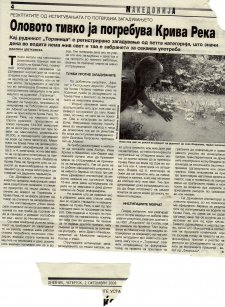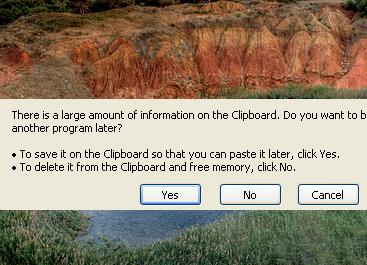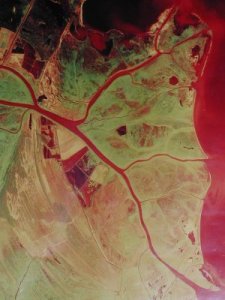By Kiril Ristovski (Posted: October 13, 2008)
The waters that are close to the mine have indicated pollution of a level-5 category, and the concentrations of lead have been above the allowed maximum level.
Presence of the heavy metals above the maximum allowed level can be found in the waters of Kriva Reka. This is a clear assessment of the results under the State Inspectorate Kumanovo, even though the assessment is late by a few months. The pollution is closest to the manufactured capacity and to the arid part of the ROC “Toranica,” according of the toxicological analysis that has been obtained from the Institute for Health Protection on the Initiative of the Fishery Organization, “Mrena” from Kriva Palanka. Measurements were taken from the location across the mine, the exact spot of the waters of Toranicka Reka.
The presence of lead was 144 000 mg,kg, which is 5 times over the maximum allowed concentrations of 30 000. These examples correspond with level-5 category of water quality. The measurements of the Kriva Reka around the arid place were showing classification on waters that belong to level-3 and level-4 water quality category .But there is one important missing part in this analysis, which is there have not been measurements of lead or zinc. The waters of Kriva Reka that are close to the pumps for drinking water are in correspondence with level-2 category of water quality.
The State Inspectorate for the Environment has announced information about results which were showing much higher presence of heavy metals on the river around the mine Toranica, but they did not give more detailed answers about the pollution. The company, “Indo minerali I metali,” will be supplied agreements, with directions about the methods and procedures regarding the regulation and taking sanctions on the pollution in that region. This was the last response directly from the State Inspectorate for the Environment.
This company has claimed that from the beginning of the pollution of the river, they had been working under regular ecological standards, taking care of the environment protection, and that their analysis has been regular. They also said that if anything goes wrong by cause of their work, they would take care of everything to protect the natural resources.
The Governmental Institutions have been inaccessible for information The residents have been reacting for three months, and they did not have adequate official information. Also, Florozon, the NGO from Skopje (under the project TAI assessment in Macedonia), has been conducting assessment for the impact of the biggest polluters of the environment in Macedonia, and ROC “Toranica” has been taken under examination through this project.
Their assessments were focused on the public access to information, public participation and access right to justice, national transparency and Government contribution regarding the environmental protection and peoples’ rights. This initiative is the biggest net in the entire world and has commitments for citizen’s insurance regarding their rights and opportunities for participations in the decision making processes related with environmental issues.
The State Inspectorate for the Environment did not respond on the official request letter regarding the results from the conducted measurement and results of the water quality of Kriva Reka. They did not act according to the law, and after one month, no one has managed to get information from the State Inspectorate for the Environment. This kind of non-compliance is not acceptable because Macedonia is party to the Aarhus Convention. This convention is based on the access right to information, public participation in the decision-making process regarding the environmental issues, according to Florozon.
According to Florozon, the assessment for the access right to information, which have been obtained by Octa, Feni, Sasa and Pollution of Kamenicka Reka, has had a bad experience, so their final report that will be delivered to the European Institutions will contain negative values.
The next step after this assessment, according to Florozon, will be the implementation of the recommendations from the TAI assessment, with an aim for capacity building of the government and of the civil associations, in order for a strong national capacity to be built. The legal recommendations are directed toward changing the law’s articles and changing government practice.
Kiril Ristovski Skopje 02.10.2008
See Also:



